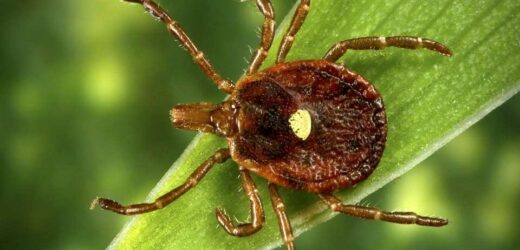A TICK that causes a severe red meat allergy for life in those it bites has arrived in the northeast.
Warm weather has brought ticks back in the mix, and particularly the lone star tick, which has become common in the Washington DC area.
The lone star stick is easy to spot, thanks to a white mark on its back that identifies females.
The male tick doesn't have the white spot, but has a different shape than a dog tick and is much larger than a deer tick.
While this tick originated in southern states, it has now spread north and west to much of the eastern half of the country, The Washington Post reported.
A bite from a lone star tick can produce a severe red meat allergy called alpha-gal syndrome.
This is because lone star ticks ingest alpha-gal sugars when they feed on mammals such as rabbits or deer, and then inject these sugars into humans when they bite them.
Since primates don't have this type of sugar in their bodies, the human body recognizes alpha-gal as a foreign substance and develops antibodies for it.
Once injected with alpha-gal from a lone star tick bite, the human body reacts when it ingests red meat, which also contains the sugar.
The body then responds to it, oftentimes much more severely than to the bite itself.
Most read in The Sun
HOT STUFF Live UK weather updates as 20C temps to blast Britain in mini-heatwave THIS WEEK
Countdown host Anne Robinson quits show after clashing with co-star Rachel Riley
Parents to be hit with murder charges after daughter 'melted into couch'
Our council house is so cramped my son can't walk & I can't even stay overnight
This kind of allergy can cause rashes, hives, swelling, itching headaches, and other symptoms, and severe cases can spark fatal reactions.
This allergy lasts a lifetime, and can become worse with time.
Read More on The US Sun
Chilling clue ‘proves Brian Laundrie’s parents KNEW their son killed Gabby’
However, not all lone star bites produce this red meat allergy.
Additionally, lone star tick bites can also transmit other diseases like Southern Tick Associated Rash Illness and ehrlichiosis, which causes flue-like symptoms.
We pay for your stories!
Do you have a story for The US Sun team?
Email us at [email protected] or call 212 416 4552.
Like us on Facebook at www.facebook.com/TheSunUS and follow us from our main Twitter account at @TheSunUS
Source: Read Full Article








